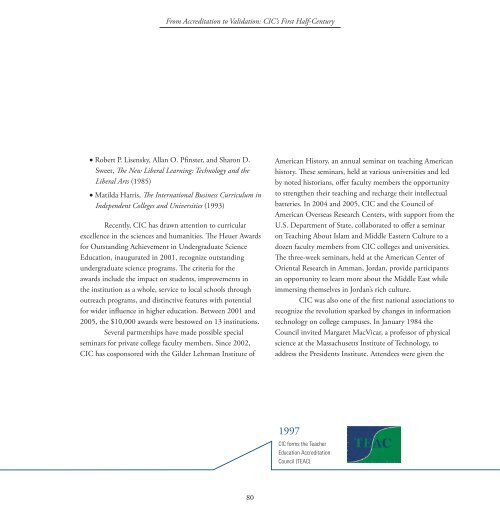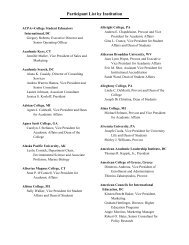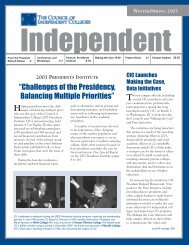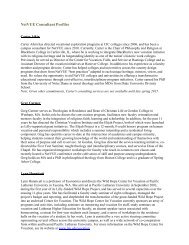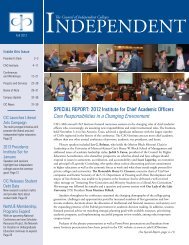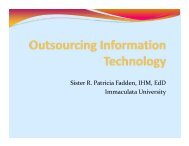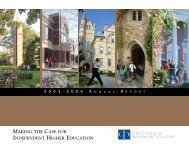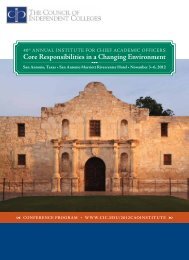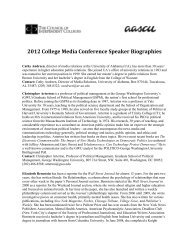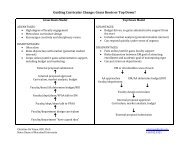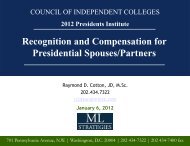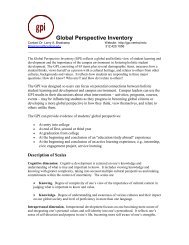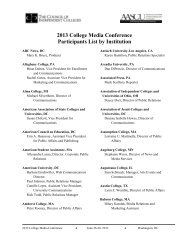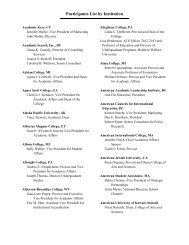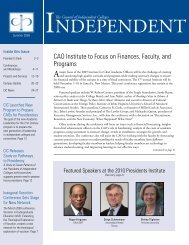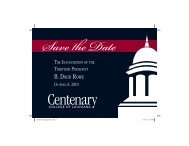Meeting the Challenge: - The Council of Independent Colleges
Meeting the Challenge: - The Council of Independent Colleges
Meeting the Challenge: - The Council of Independent Colleges
Create successful ePaper yourself
Turn your PDF publications into a flip-book with our unique Google optimized e-Paper software.
From Accreditation to Validation: CIC’s First Half-Century<br />
• Robert P. Lisensky, Allan O. Pfinster, and Sharon D.<br />
Sweet, <strong>The</strong> New Liberal Learning: Technology and <strong>the</strong><br />
Liberal Arts (1985)<br />
• Matilda Harris, <strong>The</strong> International Business Curriculum in<br />
<strong>Independent</strong> <strong>Colleges</strong> and Universities (1993)<br />
Recently, CIC has drawn attention to curricular<br />
excellence in <strong>the</strong> sciences and humanities. <strong>The</strong> Heuer Awards<br />
for Outstanding Achievement in Undergraduate Science<br />
Education, inaugurated in 2001, recognize outstanding<br />
undergraduate science programs. <strong>The</strong> criteria for <strong>the</strong><br />
awards include <strong>the</strong> impact on students, improvements in<br />
<strong>the</strong> institution as a whole, service to local schools through<br />
outreach programs, and distinctive features with potential<br />
for wider influence in higher education. Between 2001 and<br />
2005, <strong>the</strong> $10,000 awards were bestowed on 13 institutions.<br />
Several partnerships have made possible special<br />
seminars for private college faculty members. Since 2002,<br />
CIC has cosponsored with <strong>the</strong> Gilder Lehrman Institute <strong>of</strong><br />
American History, an annual seminar on teaching American<br />
history. <strong>The</strong>se seminars, held at various universities and led<br />
by noted historians, <strong>of</strong>fer faculty members <strong>the</strong> opportunity<br />
to streng<strong>the</strong>n <strong>the</strong>ir teaching and recharge <strong>the</strong>ir intellectual<br />
batteries. In 2004 and 2005, CIC and <strong>the</strong> <strong>Council</strong> <strong>of</strong><br />
American Overseas Research Centers, with support from <strong>the</strong><br />
U.S. Department <strong>of</strong> State, collaborated to <strong>of</strong>fer a seminar<br />
on Teaching About Islam and Middle Eastern Culture to a<br />
dozen faculty members from CIC colleges and universities.<br />
<strong>The</strong> three-week seminars, held at <strong>the</strong> American Center <strong>of</strong><br />
Oriental Research in Amman, Jordan, provide participants<br />
an opportunity to learn more about <strong>the</strong> Middle East while<br />
immersing <strong>the</strong>mselves in Jordan’s rich culture.<br />
CIC was also one <strong>of</strong> <strong>the</strong> first national associations to<br />
recognize <strong>the</strong> revolution sparked by changes in information<br />
technology on college campuses. In January 1984 <strong>the</strong><br />
<strong>Council</strong> invited Margaret MacVicar, a pr<strong>of</strong>essor <strong>of</strong> physical<br />
science at <strong>the</strong> Massachusetts Institute <strong>of</strong> Technology, to<br />
address <strong>the</strong> Presidents Institute. Attendees were given <strong>the</strong><br />
1997<br />
CIC forms <strong>the</strong> Teacher<br />
Education Accreditation<br />
<strong>Council</strong> (TEAC).<br />
80


